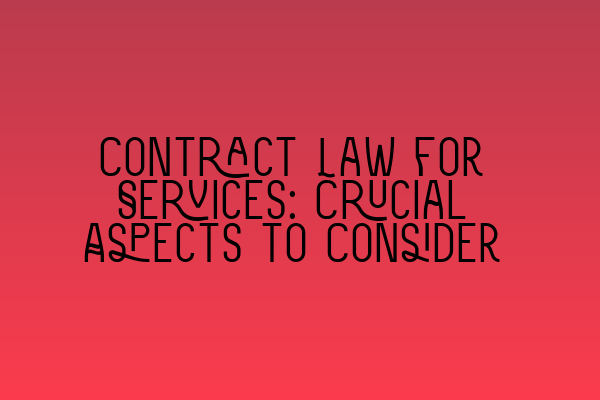As a solicitor practicing contract law, it is crucial to understand the nuances and complexities involved in drafting and negotiating contracts for services. Whether you are representing a service provider or a client seeking services, having a solid understanding of contract law is essential to protect your client’s interests and ensure a successful business relationship.
Why Contract Law Matters in Service Agreements
Service agreements are contractual agreements between a service provider and a client that outline the scope of services to be performed, the payment terms, and any other relevant terms and conditions. A well-drafted service contract is essential to protect the interests of both parties and avoid any potential disputes or misunderstandings.
When drafting a service contract, it is important to consider the following crucial aspects of contract law:
1. Offer and Acceptance
The formation of a contract requires a valid offer by one party and an acceptance of that offer by the other party. It is important to clearly define the terms of the offer, including the scope of services, the compensation, and any other essential terms. The acceptance must be clear and unambiguous to ensure that both parties are in agreement.
2. Consideration
Consideration is the exchange of something of value between the parties to the contract. In a service agreement, consideration usually takes the form of payment for the services to be rendered. It is important to clearly define the amount and method of payment to avoid any potential disputes.
3. Defining the Scope of Services
The scope of services is one of the most critical aspects of a service agreement. It is essential to clearly define the services to be performed, the timeline for completion, and any specific deliverables or milestones. This helps to manage client expectations and ensure that both parties are on the same page.
Related article: LLC Formation Made Simple: Step-by-Step Guide for UK Entrepreneurs
4. Performance and Quality Standards
It is important to include provisions in the service agreement that establish performance and quality standards. This helps to ensure that the service provider meets the client’s expectations and provides services of the desired quality. Clear metrics and benchmarks can be set to evaluate the performance and quality of the services rendered.
5. Confidentiality and Non-Disclosure
Many service agreements involve the exchange of sensitive or proprietary information. It is crucial to include provisions that protect the confidentiality of such information and prevent its unauthorized disclosure. Non-disclosure agreements (NDAs) can be used to provide an additional layer of protection for the parties involved.
Related article: Delaware Corporate Law for UK Solicitors: Key Insights and Practices
6. Termination and Remedies
It is important to include provisions for termination and remedies in the event of a breach of the service agreement. These provisions define the rights and obligations of the parties in case of non-performance or breach of contract. They may include provisions for termination, dispute resolution mechanisms, and remedies such as damages or specific performance.
7. Governing Law and Jurisdiction
It is essential to include a governing law and jurisdiction clause in the service agreement. This determines which legal system will govern the contract and which courts will have jurisdiction in the event of a dispute. The choice of law and jurisdiction should be carefully considered based on the parties’ preferences and the practicality of enforcing the contract.
Related article: Complying with Legal Obligations: Delaware LLCs in the UK
The Role of an Expert Solicitor in Drafting Service Contracts
As a solicitor, your role in drafting service contracts is crucial for ensuring that your clients’ interests are protected and that the contracts are enforceable. Here are a few important ways in which an expert solicitor can add value:
1. Legal Expertise
An expert solicitor has a deep understanding of contract law and can provide valuable insights and advice on the specific legal requirements and implications of the service agreement. They can help identify potential risks and suggest appropriate contract provisions to mitigate those risks.
2. Drafting and Negotiation
An expert solicitor can draft the service agreement in a clear and concise manner, using precise language that leaves no room for ambiguity or misinterpretation. They can also negotiate the terms of the contract on behalf of their clients to ensure that their interests are protected.
Related article: The SQE for International Lawyers: A Bridge to British Legal Practice
3. Customization
Every service agreement is unique, and an expert solicitor can customize the contract to meet the specific needs and requirements of their clients. They can tailor the terms and conditions, as well as the provisions related to indemnification, limitation of liability, and intellectual property rights, among others.
4. Risk Management
An expert solicitor can assess the risks associated with the service agreement and suggest appropriate risk management strategies. They can help identify potential legal pitfalls and advise their clients on how to minimize the risk of disputes or litigation.
Related article: Expert Insights: Solicitors in UK Courts – Tips and Strategies for Success
Conclusion
Understanding the crucial aspects of contract law is essential when dealing with service agreements. As a solicitor, it is your responsibility to ensure that your clients are fully protected and that their interests are safeguarded through carefully drafted and negotiated service contracts. By considering the key aspects outlined in this article and leveraging your legal expertise, you can help your clients navigate the complexities of contract law and foster successful business relationships.
